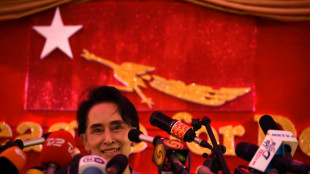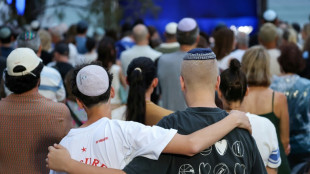
-
 Myanmar pro-military party claims Suu Kyi's seat in junta-run poll
Myanmar pro-military party claims Suu Kyi's seat in junta-run poll
-
Fed chair Powell says targeted by federal probe

-
 Trailblazing Milos Raonic retires from tennis
Trailblazing Milos Raonic retires from tennis
-
Australia recalls parliament early to pass hate speech, gun laws

-
 'One Battle After Another,' 'Hamnet' triumph at Golden Globes
'One Battle After Another,' 'Hamnet' triumph at Golden Globes
-
Japan aims to dig deep-sea rare earths to reduce China dependence

-
 Top UN court to hear Rohingya genocide case against Myanmar
Top UN court to hear Rohingya genocide case against Myanmar
-
US sends more agents to Minneapolis despite furor over woman's killing

-
 Trump says Iran 'want to negotiate' after reports of hundreds killed in protests
Trump says Iran 'want to negotiate' after reports of hundreds killed in protests
-
Bangladesh's powerful Islamists prepare for elections

-
 NBA-best Thunder beat the Heat as T-Wolves edge Spurs
NBA-best Thunder beat the Heat as T-Wolves edge Spurs
-
Ukraine's Kostyuk defends 'conscious choice' to speak out about war

-
 Trump says working well with Venezuela's new leaders, open to meeting
Trump says working well with Venezuela's new leaders, open to meeting
-
Asian equities edge up, dollar slides as US Fed Reserve subpoenaed

-
 Hong Kong court hears sentencing arguments for Jimmy Lai
Hong Kong court hears sentencing arguments for Jimmy Lai
-
Powell says Federal Reserve subpoenaed by US Justice Department

-
 Chalamet, 'One Battle' among winners at Golden Globes
Chalamet, 'One Battle' among winners at Golden Globes
-
Turning point? Canada's tumultuous relationship with China

-
 Eagles stunned by depleted 49ers, Allen leads Bills fightback
Eagles stunned by depleted 49ers, Allen leads Bills fightback
-
Globes red carpet: chic black, naked dresses and a bit of politics

-
 Maduro's fall raises Venezuelans' hopes for economic bounty
Maduro's fall raises Venezuelans' hopes for economic bounty
-
Golden Globes kick off with 'One Battle' among favorites

-
 Australian Open 'underdog' Medvedev says he will be hard to beat
Australian Open 'underdog' Medvedev says he will be hard to beat
-
In-form Bencic back in top 10 for first time since having baby

-
 Swiatek insists 'everything is fine' after back-to-back defeats
Swiatek insists 'everything is fine' after back-to-back defeats
-
Wildfires spread to 15,000 hectares in Argentine Patagonia

-
 Napoli stay in touch with leaders Inter thanks to talisman McTominay
Napoli stay in touch with leaders Inter thanks to talisman McTominay
-
Meta urges Australia to change teen social media ban

-
 Venezuelans await political prisoners' release after government vow
Venezuelans await political prisoners' release after government vow
-
Lens continue winning streak, Endrick opens Lyon account in French Cup

-
 McTominay double gives Napoli precious point at Serie A leaders Inter
McTominay double gives Napoli precious point at Serie A leaders Inter
-
Trump admin sends more agents to Minneapolis despite furor over woman's killing

-
 Allen magic leads Bills past Jaguars in playoff thriller
Allen magic leads Bills past Jaguars in playoff thriller
-
Barca edge Real Madrid in thrilling Spanish Super Cup final

-
 Malinin spearheads US Olympic figure skating challenge
Malinin spearheads US Olympic figure skating challenge
-
Malinin spearheads US figure Olympic figure skating challenge

-
 Iran rights group warns of 'mass killing', govt calls counter-protests
Iran rights group warns of 'mass killing', govt calls counter-protests
-
'Fragile' Man Utd hit new low with FA Cup exit

-
 Iran rights group warns of 'mass killing' of protesters
Iran rights group warns of 'mass killing' of protesters
-
Demonstrators in London, Paris, Istanbul back Iran protests

-
 Olise sparkles as Bayern fire eight past Wolfsburg
Olise sparkles as Bayern fire eight past Wolfsburg
-
Man Utd knocked out of FA Cup by Brighton, Martinelli hits hat-trick for Arsenal

-
 Troubled Man Utd crash out of FA Cup against Brighton
Troubled Man Utd crash out of FA Cup against Brighton
-
Danish PM says Greenland showdown at 'decisive moment' after new Trump threats

-
 AC Milan snatch late draw at Fiorentina as title rivals Inter face Napoli
AC Milan snatch late draw at Fiorentina as title rivals Inter face Napoli
-
Venezuelans demand political prisoners' release, Maduro 'doing well'

-
 'Avatar: Fire and Ashe' leads in N.America for fourth week
'Avatar: Fire and Ashe' leads in N.America for fourth week
-
Bordeaux-Begles rout Northampton in Champions Cup final rematch

-
 NHL players will compete at Olympics, says international ice hockey chief
NHL players will compete at Olympics, says international ice hockey chief
-
Kohli surpasses Sangakkara as second-highest scorer in international cricket


Clouds and conspiracies: concerns over push to make rain
Can countries control the clouds? And should they?
As climate change drives floods and drought, rainmaking is in fashion across the world, despite mixed evidence that it works and concerns it can stoke cross-border tensions.
While attempting to control the weather might sound like science fiction, countries have been seeding clouds for decades to try to make rain or snow fall in specific regions.
Invented in the 1940s, seeding involves a variety of techniques including adding particles to clouds via aircraft.
It is used today across the world in an attempt to alleviate drought, fight forest fires and even to disperse fog at airports.
In 2008, China used it to try to stop rain from falling on Beijing's Olympic stadium.
But experts say that there is insufficient oversight of the practice, as countries show an increasing interest in this and other geoengineering techniques as the planet warms.
The American Meteorological Society has said that "unintended consequences" of cloud seeding have not been clearly shown -- or ruled out -- and raised concerns that unanticipated effects from weather modification could cross political boundaries.
But experts say the main risk might be more a matter of perception.
"If a country learns that its neighbour is changing the weather, it will be tempted to blame the neighbour to explain a drought," according to a research note published this month by Marine de Guglielmo Weber, a researcher at France's Strategic Research Institute at the Paris Military School (IRSEM).
China, for example, is one of the world's most prolific weather modifiers, launching the Sky River initiative in 2018 with the aim of alleviating water shortages and boosting the country's food security.
The country has conducted operations on the Tibetan plateau, but de Guglielmo Weber warned that this could be seen to affect water availability in downstream countries, such as its rival India.
- 'Cloud theft' -
French writer Mathieu Simonet, who has campaigned for clouds to have UN protection, said seeding could stoke fake news and misinformation "in today's explosive world".
"I think the real risk of cloud theft is psychological," he said.
In 2018, for example, an Iranian general accused Israel of "stealing clouds" to prevent rain falling in Iran, which was then suffering a severe drought.
In a context of "extremely intense informational confusion", de Guglielmo Weber warned: "Sometimes it's the conspiracy that wins out," adding that this can be fuelled by mistrust of scientific institutions.
In 2024, for example, following huge floods in southern Brazil and in the United Arab Emirates, thousands of climate sceptic social media accounts spread false accusations that the torrential rains were triggered by cloud seeding.
De Guglielmo Weber said that raises the challenge of proving, or disproving, the role of weather modification.
And there have been instances when cloud seeding was used deliberately in warfare.
The United States used it during "Operation Popeye" to slow the enemy advance during the Vietnam War.
In response, the UN created a 1976 convention prohibiting "military or any other hostile use of environmental modification techniques".
A number of countries have not signed the convention, said de Guglielmo Weber. She added that the accord "is very limited" and does not apply if a country causes a climate hazard by accident.
- 'Silver bullet' -
Researcher Laura Kuhl said there was "significant danger that cloud seeding may do more harm than good", in a 2022 article for the Bulletin of the Atomic Scientists.
"Cloud seeding is perhaps the ultimate silver bullet, in which literal silver in the form of silver iodide is infused into clouds, causing ice crystals to form and water to condense into rain or snow," wrote Kuhl, an associate professor at Northeastern University in the United States, a specialist in climate adaptation.
She said technological fixes like weather manipulation could distract attention from more complex discussions and reinforce things like unequal water access.
Meanwhile, research on the effects of cloud seeding on neighbouring regions is mixed -- and some evidence suggests it does not work very well even in the target area.
An assessment published in 2019 by an expert team on weather modification from the World Meteorological Organization found seeding increases precipitation between "essentially zero" and around 20 percent.
It recognised that more countries were turning to cloud seeding but added: "Sometimes desperate activities are based on empty promises rather than sound science."
F.AbuZaid--SF-PST



